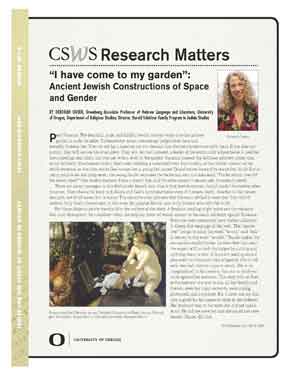 Winter 2014, CSWS Research Matters: “I have come to my garden”: Ancient Jewish Constructions of Space and Gender—by Deborah Green, Greenberg Associate Professor of Hebrew Language and Literature, Department of Religious Studies; Director, Harold Schnitzer Family Program in Judaic Studies.
Winter 2014, CSWS Research Matters: “I have come to my garden”: Ancient Jewish Constructions of Space and Gender—by Deborah Green, Greenberg Associate Professor of Hebrew Language and Literature, Department of Religious Studies; Director, Harold Schnitzer Family Program in Judaic Studies.
Religious studies professor Deborah Green uses a painting by the Italian Renaissance master Tintoretto to explore ancient Jewish constructions of space and gender in the latest issue of Research Matters, a publication of the UO Center for the Study of Women in Society. Green’s paper, “‘I have come to my garden’: Ancient Jewish Constructions of Space and Gender,” discusses the experience of the faithful Jewish heroine Susanna, who is accosted by two corrupt judges when she walks into her private garden to bathe. Tintoretto’s masterpiece shows the elderly judges leering at her from behind the lush vegetation, while she bathes in nude innocence of their spying eyes. Because she refuses their advances, Susanna is condemned to death through their lies.
Green writes: “While many scholars have written on these aspects of the narrative, in my current project I am more concerned with other sub-surface aspects of the narrative: the sexual tension; how gender plays out in the story; the garden itself, its flora and fauna and its space; and why and how these aspects come together so often in post-biblical interpretation. I work with the biblical texts and the Jewish interpretive texts that date from the Hellenistic period through the late Roman period in the land of Israel (~300 B.C.E. – 400 C.E.). My overall goal is to understand how daily experience influences interpretation and the theological or didactic claims that Jewish elites (all males) put forth. I translate and analyze the literature and then study the material culture and history. With my grant from the Center for the Study of Women in Society (CSWS), I was able to focus on the literary part of my study.”
The Winter 2014 issue of Research Matters is available online.

